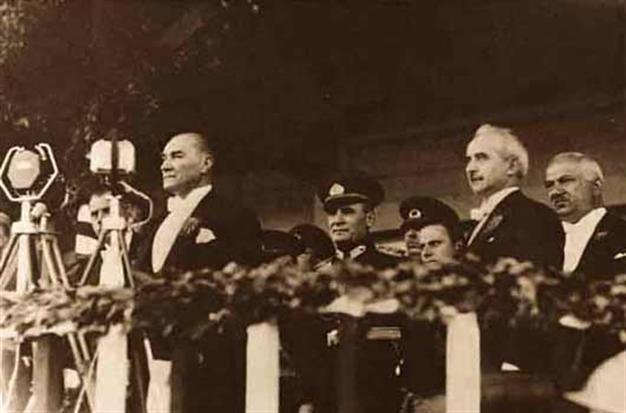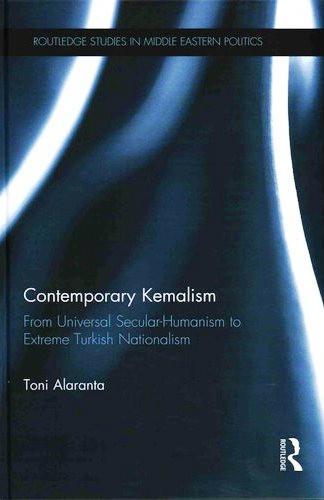Kemalism: From secular-humanism to extreme Turkish nationalism
William ARMSTRONG - william.armstrong@hdn.com.tr
 ‘Contemporary Kemalism: From Universal Secular-Humanism to Extreme Turkish Nationalism’ by Toni Alaranta (Routledge, £75, 150 pages)
‘Contemporary Kemalism: From Universal Secular-Humanism to Extreme Turkish Nationalism’ by Toni Alaranta (Routledge, £75, 150 pages)
One of the ironies of the early Turkish Republic’s westernizing project is that it was forged in anti-imperialist defiance of Western powers. In this it resembled many non-Western nationalist projects, but heirs to the Kemalist political tradition in Turkey have experienced a troubled development ever since. As political scientist Toni Alaranta describes in this astute new book, a distinct caliber of Kemalists has emerged in recent decades, stamped by virulent “anti-Westernism, anti-globalization [and] a recurrent emphasis on the nationalist aspects of Mustafa Kemal Atatürk’s ideas.” For many, it often seems that anti-imperialism and ethno-nationalism, and national isolation (dressed up as “complete independence”) have become even more important than the principle of secularism. While Alaranta does not aim to rehabilitate the more extreme forms of contemporary Kemalist thought, he does successfully question the shaky foundations of the postmodern liberal assumptions that have consigned to the dustbin the Turkish Republic’s founding doctrine of secular nationalism. While Kemalism may not have the answers for the modern world, neither does what replaced it as conventional intellectual wisdom in Turkey.

The challenge to Kemalist hegemony emerged from a shift that occurred in mainstream political theory during the 20th century, from the classical modernist conception of development to liberal postmodernist relativism. The former emphasized the ability of education, science and technology to universally reshape human motivation and memory, and was usually expressed through nationally-bound modernization drives, as in the Kemalist early Turkish Republic. The postmodernist reaction later emerged against the perceived rigidity of such “essentialist universalism,” cherishing diversity as more sympathetic to complex social reality. It saw “one path to modernity” as a crude extension of the Enlightenment project, at worst leading down the path to authoritarianism. As one definition puts it, classical modernism came to be seen as being “dominated by nationalist universalist fundamentalism, universalism ... absolutism of truth, naive trust in progress, worship of science and technology ... exclusivity and contempt for inferior civilizations.”
Alaranta writes that this “post-ideological, multiculturalist new world order” now dominates the Turkish social sciences, and the received wisdom among liberal-minded people in Turkey and abroad is that Kemalism is a busted flush, a stick-in-the-mud relic detached from present day challenges. This paradigm shift has been underpinned by two broader tendencies at odds with the fundamental tenets of Kemalism over the last 30-40 years: Accelerated economic globalization and resurgent cultural-religious sentiment (“resacralization”) across much of the world. Rigid secularism and uncompromising nationalism are now seen as poorly equipped to deal with such complex dynamics, but Alaranta questions these easy assumptions by defending the broad Enlightenment tradition from which Kemalism is drawn - if not the most problematic specifics of Kemalist ideology. This involves detailing the liberal philosophy of history written within Kemalism, as well as accounting for the influence that the republican project had in producing popular acceptance for various principles that work as a necessary precondition of popular sovereignty: Secularism, equality before the law, public universal education, and the national political community. By considering Kemalist modernization as exclusively an authoritarian militaristic project, its harshest critics fail to recognize that this project arguably lay much of the groundwork – even if only inadvertently in some cases - for its own contestation later on.
What’s more, for all its claims to the contrary, postmodern liberalism cannot itself be thought of a non-ideological and non-essentialist alternative. There’s a fundamental hypocrisy in many self-described liberals who attack Kemalist rigidities while often ignoring those of ascendant religious conservatives. In Turkey, Alaranta writes, “the Islamic intellectuals have used this ‘postmodern theory of knowledge’ to criticize Kemalism, but they reject the idea that religious truths are relative in the same sense … the idea of multiple knowledge is used against Kemalism but is not allowed to be used against the ‘eternal truths of Islam.’” Too many in Turkey have been willing accomplices to this process, all too happy to make excuses in the name of a “bigger picture” and Turkey’s “special conditions.”
That argument is often repeated by Kemalists, but it’s also worth saying that the most pertinent threat to Turkey’s democracy today does not necessarily come from religious fundamentalism. Running as an undercurrent throughout this study is the thesis that the current Justice and Development Party (AKP) government is the undemocratic Islamist beneficiary of the wholesale disregarding of Kemalism. But it’s important to note that much of the criticism of the AKP doesn’t necessarily come from suspicion of religion, but rather from its crony capitalist power-grab and its authoritarian colonizing of state institutions (with only an opportunistic rhetorical religious overlay). Unfortunately, Alaranta’s book is so theoretical that it fails to address concrete developments in Turkish politics in recent years. If his argument were applied more practically, I suspect more holes would likely emerge.
Nevertheless, on the whole this is a bracing and lucid read that asks some tough questions. By throwing out the bathwater of Kemalism, the baby of the Enlightenment may also have been abandoned in Turkey. That’s not a prospect that should be dismissed as airily as many self-described liberals suggest
.
 ‘Contemporary Kemalism: From Universal Secular-Humanism to Extreme Turkish Nationalism’ by Toni Alaranta (Routledge, £75, 150 pages)
‘Contemporary Kemalism: From Universal Secular-Humanism to Extreme Turkish Nationalism’ by Toni Alaranta (Routledge, £75, 150 pages) The challenge to Kemalist hegemony emerged from a shift that occurred in mainstream political theory during the 20th century, from the classical modernist conception of development to liberal postmodernist relativism. The former emphasized the ability of education, science and technology to universally reshape human motivation and memory, and was usually expressed through nationally-bound modernization drives, as in the Kemalist early Turkish Republic. The postmodernist reaction later emerged against the perceived rigidity of such “essentialist universalism,” cherishing diversity as more sympathetic to complex social reality. It saw “one path to modernity” as a crude extension of the Enlightenment project, at worst leading down the path to authoritarianism. As one definition puts it, classical modernism came to be seen as being “dominated by nationalist universalist fundamentalism, universalism ... absolutism of truth, naive trust in progress, worship of science and technology ... exclusivity and contempt for inferior civilizations.”
The challenge to Kemalist hegemony emerged from a shift that occurred in mainstream political theory during the 20th century, from the classical modernist conception of development to liberal postmodernist relativism. The former emphasized the ability of education, science and technology to universally reshape human motivation and memory, and was usually expressed through nationally-bound modernization drives, as in the Kemalist early Turkish Republic. The postmodernist reaction later emerged against the perceived rigidity of such “essentialist universalism,” cherishing diversity as more sympathetic to complex social reality. It saw “one path to modernity” as a crude extension of the Enlightenment project, at worst leading down the path to authoritarianism. As one definition puts it, classical modernism came to be seen as being “dominated by nationalist universalist fundamentalism, universalism ... absolutism of truth, naive trust in progress, worship of science and technology ... exclusivity and contempt for inferior civilizations.”